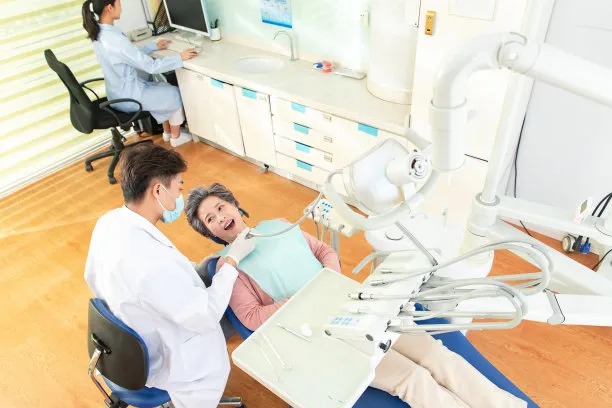Summary: Dental fillings are essential for restoring oral health after cavities or tooth damage. However, proper precautions must be taken before and after the procedure to ensure optimal results. This article outlines essential precautions, focusing on preparation, dietary considerations, post-treatment care, and follow-up practices. Each category emphasizes the importance of safeguarding both the filling and overall dental health, ensuring a smooth recovery and long-lasting effectiveness of the treatment.
1. Preparing for Your Dental Filling

Preparation is paramount when youre scheduled for a dental filling. First, it is vital to communicate openly with your dentist about any allergies, medications, or medical conditions you may have. This informs them about potential risks and helps tailor the treatment plan accordingly, ensuring both safety and effectiveness.
Secondly, consider scheduling your appointment for a time when you can relax afterward. Dental work, even routine filling procedures, can cause mild discomfort. Arranging for at least a few hours of recovery time can ease anxiety and allow your body to adjust after the anesthesia wears off.
Lastly, its also crucial to practice good oral hygiene leading up to the appointment. Brushing and flossing regularly not only minimizes the risk of infection but also aids in the overall health of your teeth, making the filling process smoother.
2. Dietary Considerations Before Filling
Your diet leading up to the dental filling appointment can influence the procedure. A day or two before your appointment, try to avoid hard, sticky, or chewy foods that could irritate the affected tooth. Soft, nutritious foods will help you avoid discomfort and are easier on your teeth.
Moreover, if you have a dental anesthetic planned for the filling procedure, be aware of what you can eat beforehand. Many dentists recommend not consuming anything for a few hours before your appointment, especially if youll be receiving sedation. Ensure you follow your dentist’s instructions regarding fasting to prevent any complications during the procedure.
Additionally, stay hydrated but limit sugary drinks. Water is ideal, but keeping your sugar intake low will safeguard your teeth from further decay while you await treatment.
3. Post-Treatment Care for Dental Fillings
After receiving a dental filling, post-treatment care is crucial to ensure the longevity of the filling and overall oral health. To start, avoid eating for at least two hours after the procedure. This allows the anesthetic to wear off and helps prevent accidental biting of your tongue or cheek.
Another essential aspect is to steer clear of hard and sticky foods for at least 24 hours. Foods that require excessive chewing can put unnecessary pressure on your new filling and may even lead to dislodging it.
Moreover, maintain good oral hygiene practices. Brush your teeth gently but effectively, focusing on the filled area, ensuring it remains clean to ward off any potential infections. Regular flossing should be continued but approached with care around the filling to avoid dislodging it.
4. Importance of Follow-Up Appointments
Post-filling follow-up appointments serve as critical checkpoints for assessing the effectiveness of your new filling. These visits allow your dentist to evaluate the integrity of the filling and ensure it’s properly set and functioning as intended.
Furthermore, these follow-ups can help identify any issues early. Discomfort or sensitivity that persists for longer than a couple of weeks should be flagged and discussed with your dentist, as this may indicate complications that need to be addressed.
Last but not least, regular dental check-ups are essential for maintaining oral health beyond a single filling. These appointments help monitor teeth for additional cavities and overall health, aiding in the prevention of future dental issues.
Summary:
In conclusion, taking essential precautions before and after receiving a dental filling is crucial for optimal oral health. Through careful preparation, mindful dietary choices, diligent post-treatment care, and regular follow-ups, you can significantly bolster the longevity and effectiveness of your dental fillings. This strategic approach promotes a healthier mouth and a brighter smile.
This article is compiled by Vickong Dental and the content is for reference only.
Vickong Dental
Vickong Dental is a large medical group established in Hong Kong in 2008 by professors from well-known medical universities in Guangdong and Hong Kong, as well as medical doctors from key national '985' universities (including Master's supervisors and senior professors). The chain of branches brings together expert dentists with PhDs and Master's degrees from Hong Kong and Mainland China, committed to providing high-quality dental treatment.
"Vickong Dental Practices the University Motto of 'Healing and Serving Society,' with a Stable Operation for Sixteen Years. It Has Been honored with Hong Kong Enterprise Leaders's Choice,' and is a Global Trusted Implant Center for the Nobel Implant System. Recommended by Hong Kong Metro Broadcast and Guangdong Television, it Serves Customers from Over Thirty Countries and Regions, Gaining the Trust and Favor of Citizens from the Guangdong-Hong Kong-Macau Greater Bay Area and Surrounding Cities.

Thousands of customers' unanimous praise
The most recognized and highly recommended dental service by customers in the Guangdong-Hong Kong-Macau Greater Bay Area
We Ensure You Receive Detailed Care and Attention Here
Hong Kong standards, Shenzhen prices, Your Trusted English-speaking dentists

Vickong Dental Medical-Grade Instrument Disinfection Process
Vickong Dental Medical-Grade Instrument Disinfection Process

Vickong Dental Chain: A Warm and Comfortable Environment for Treatment






Appointment Hours

Q&A
Why choose Vickong Dental?
Vickong Dental practices the university motto 「Medicine to Benefit Society」, with each branch bringing together highly qualified dentists with doctoral and master’s degrees from Hong Kong and the Mainland, and has maintained seventeen years of steady operation。Recipient of 「2024 Hong Kong Enterprise Leaders Brand」, 「2025 Hong Kong Enterprise Leaders Brand」, a Nobel Biocare Global Trusted Implant Center, and a brand recommended by Metro Radio Hong Kong and Guangdong TV。
To date, we have served customers from more than thirty countries and regions,earning exceptionally high word-of-mouth recognition and trusted recommendations from residents across the Guangdong-Hong Kong-Macao Greater Bay Area and surrounding cities
We have eight major branches in Zhuhai、Shenzhen,and a consultation and service assurance center in Hong Kong,so you can book a free consultation at any time for any questions,which is very reassuring.
If I do not accept the quotation after the CT scan, will I be charged??
No! As long as the actual treatment has not started, you will not be charged any fees.
Will there be any additional charges during the treatment process?
No, there won’t be any additional charges. Before treatment begins, we will clearly explain the treatment plan and its corresponding fees. Only after the patient agrees and signs the consent form will we proceed with the dental service.
Can I pay in Hong Kong dollars?
Yes. Vickong Dental accepts payment in Hong Kong dollars. The amount will be converted based on the exchange rate of the day, and the applicable rate will be clearly communicated to you in advance.
Can I reschedule my appointment at any time?
Yes. Please contact us via **WeChat** or **WhatsApp** as early as possible, providing your original appointment time and details, along with your preferred new date and time slot for rescheduling.













